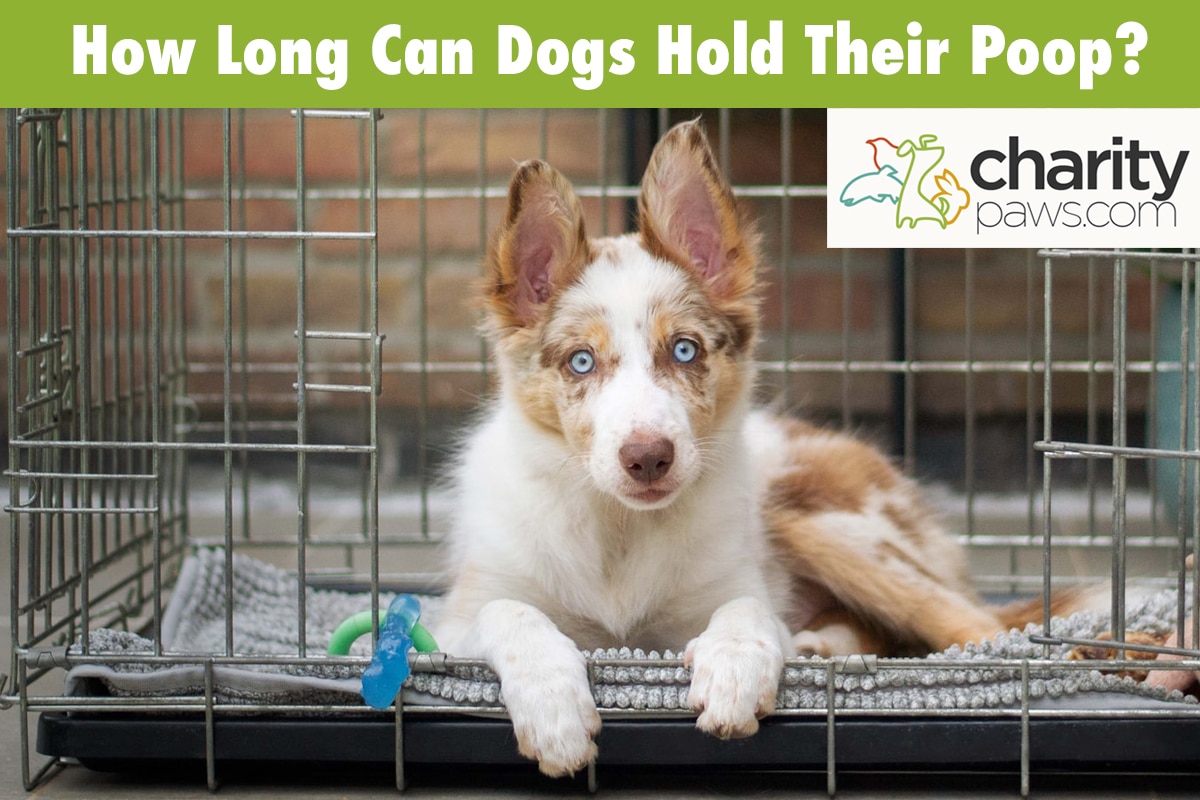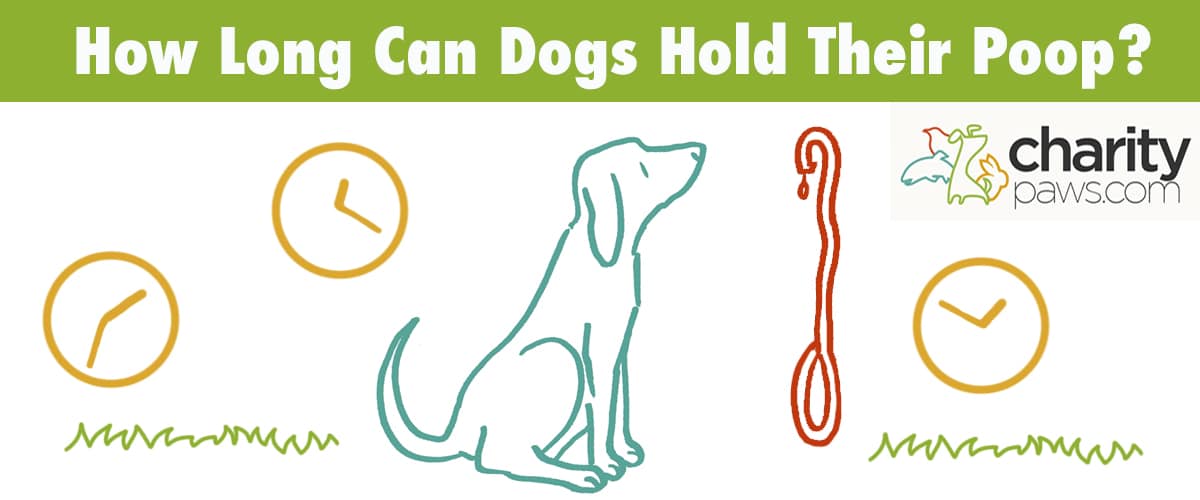Most of us with a canine companion need to adapt our schedule to fit some of their needs.
One of the many things we need to consider is a dog’s poop schedule, as we need to make sure we offer them plenty of potty breaks outdoors.
In order to do this, you should not only be aware of how often a dog poops each day, but how long most dogs can hold their poop as well.
In this article we will discuss how long adult dogs and puppies can hold their poop, and the details you need to determine your dog’s poop schedule going forward.
How Often Should Adult Dogs Poop?

When determining how often your adult dog can hold their poop, you should first have an idea of how many times a day they should poop in the first place.
Their poop schedule will vary based on the diet they consume and how much they eat each day, and even based on how active they are.
An elderly dog that is not too active may only poop once daily, while a young playful adult may poop multiple times.
With each varying factor aside, it’s safe to say that most adult dogs poop anywhere from 1 to 3 times a day.
Each round of stool should be firm enough to pick up easily, and should be anywhere from light to dark brown in color.
How Often Should Puppies Poop?
A growing puppy needs plenty of fuel to nourish their body and keep up with their energy requirements.
This means that all puppies should not only be eating a diet made for their age range, but they should be eating more frequently than an adult dog.
More food equals more poop, so you can expect most puppies to pass stool more often than an adult canine friend.
More food equals more poop for a growing puppy.
Where most adult dogs poop anywhere from 1 to 3 times a day, most puppies will poop anywhere from 3 to 5 times a day.
Their poop can be a bit softer than an adult dog’s poop, but it should still be firm enough to pick up easily.
You can also expect their poop to vary in shades from light to dark brown.
How Long Can Adult Dogs Hold Their Poop?
Now that you understand how many times a day your adult dog should poop, you can begin to plan a schedule that fits your dog’s bathroom needs.
Holding their poop is a concept that only potty trained dogs will understand, so it’s essential to first make sure your pup is comfortable with only passing stool outside.
Once your dog is potty trained, they can begin to hold their stool for periods of time when you are away from home.
Though this can vary with each dog, it’s safe to say that most adult dogs can hold their poop for 7-8 hours after eating.
How Long Can Puppies Hold Their Poop?

As we mentioned above, a growing puppy will not only need to eat more food each day, but they will also need to poop more because of it.
This means that not only will you need to account for more potty breaks throughout your day, but you should also be aware of the fact that they can’t hold their poop as long as adult dogs.
Control of their bowels typically comes with age, so a puppy just can’t be expected to hold it for long periods.
On average, most puppies can hold their poop for anywhere from 3-5 hours after eating.
Puppies under the age of 4 months may only be able to hold their poop for 3 hours, while older pups might make it to 6.
This timing also varies based on how well potty trained they are, as well as how many times a day they are eating.
How Long After Eating Will My Dog Need To Poop?
Every dog will have their own pooping schedule based on their normal meal times, but we always suggest taking your dog outside after each meal.
Eating can kickstart a dog’s digestion after a period without food, causing things to ‘move along’ and cause an urge to pass stool.
This is especially important in the morning after they eat breakfast, as they are likely ready to pass the food they consumed the night before.
Once they have had their morning poop, they can withstand a wait until their next trip outside.
Can My Dog Get Sick From Holding Their Poop?
If you ever have to be away from home for more than 8 hours, you may wonder if your dog can get sick from having to hold their poop this long.
While one day of holding it longer than usual should not cause any serious complications, a dog can become ill if they do not poop for 24 hours or more.
Though it may seem strange that this would even occur, there are situations in which this is common.
Dogs may hold their poop for extended periods if they are:
- Stressed
- Constipated
- Hiding
- Dehydrated
- Have infected anal glands
- Cannot posture without pain
- Trapped in a cage for long periods
If their fecal matter backs up within their colon and intestines, this can certainly lead to illness in many dogs.
It’s important to be aware of the general discomfort that comes along with being constipated.
These dogs will often suffer from abdominal pain and discomfort as they attempt to pass stool, especially if they have developed a fecal impaction.
A dog with severe constipation may also experience lethargy, anorexia, vomiting, and a serious complication known as megacolon.
Again, these complications do not occur after one day of having to hold their poop for a long period, but rather with extended periods of not passing stool.
If your pup has not pooped for more than 24 hours, we suggest reaching out to your vet for guidance.
Is My Dog Constipated?
What if your dog that is typically on a set pooping schedule has not pooped for 24 hours?
If that’s the case, it’s very possible that they are experiencing constipation.
Constipation in dogs can develop as a result of factors ranging from dehydration to painful anal glands, but many cases will display a few common symptoms.
Some of the most common signs of constipation in dogs include:
- Straining when passing stool
- Straining and only passing small pebbles of stool
- Dehydrated stool
- Whining when passing stool
- Traces of blood in stool after straining
- Attempting to pass stool, but nothing is produced
- Anorexia
- Lethargy
- Abdominal pain
If you notice any of the above symptoms in your canine friend, we suggest reaching out to your vet for guidance.
Most cases of minor constipation can be resolved with fluid therapy and specialized diets, but others may require prescribed medications or enemas.
The best way to offer your pup a fast recovery is by contacting your vet at the first sign of constipation.
How Long Can A Dog Hold Diarrhea?
Things get a bit more complicated when discussing how long a dog can hold their diarrhea.
Diarrhea can cause unbearable abdominal pain when your dog attempts to hold it, causing them to ignore their potty training and go wherever possible.
Diarrhea can cause a sense of urgency that cannot be ignored, making it impossible to guess just how long our pups can hold it for.
If you are caring for a dog with diarrhea, it’s important to offer them multiple potty breaks throughout the day.
Your dog may need to go outside as many as 5 times a day and even more if they are showing signs of needing to go out.
Giving them plenty of opportunities to relieve themselves is essential as they recover.
If you do need to leave your house for an extended period when your dog has diarrhea, we suggest putting them in a controlled space with plenty of potty pads.
This will make it easier to clean up any accidents, and this will also allow you to monitor just how much diarrhea they had while you were away.
Final Thoughts
Whether you have a new puppy or a long time canine friend, you will need to factor daily potty breaks into your routine.
Once you get to know your pup and their poop schedule, you will soon establish a poop routine that works for both of you.

